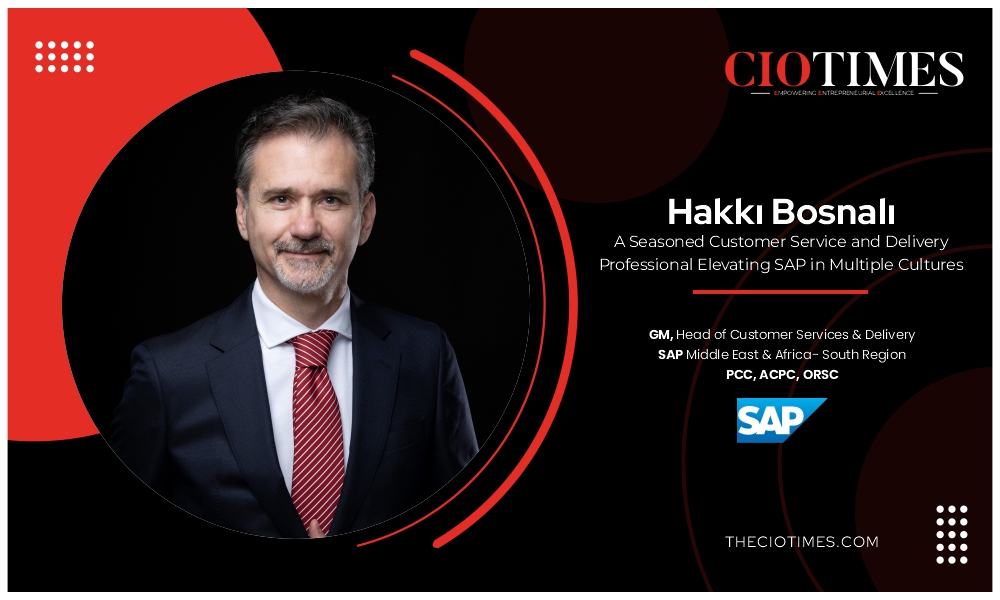“With two decades of expertise spanning logistics, AI, and enterprise systems, Abdullah AbuSido is rewriting the rules of digital transformation in the Middle East’s fast-moving consumer sector.”
Abdullah AbuSido is a transformative force behind enterprise-wide innovation at Abudawood Group—a diversified international conglomerate and premier distributor of global brands like Procter & Gamble, Ferrero, and Quaker. As Director of Business Applications, he is spearheading a digital evolution that transcends traditional logistics, weaving agility and intelligence into every layer of operations, sales, finance, and supply chain. His approach redefines how data, AI, and business intelligence converge to tackle real-world challenges across functions and geographies, setting a new benchmark for tech-enabled growth in FMCG.
Abdullah is known to blend deep domain expertise in supply chain technology with strategic oversight in trade promotion, financial analytics, and commercial operations. His leadership has been pivotal in deploying AI-powered platforms that streamline planning, enhance visibility, and synchronize execution across five key markets: Saudi Arabia, Egypt, Iraq, Pakistan, and Bahrain. Under his guidance, Abudawood is transitioning into a data-driven, automated ecosystem—one that empowers teams, elevates customer experience, and fuels sustainable growth.
In recognition of this transformation, Abdullah and the Abudawood Group were honored with the Boomi EMEA 2024 Customer Innovation Award, celebrated as one of the most innovative customers across the region. This accolade reflects the team’s pioneering work in API-led integrations, agile automation, and platform orchestration using Boomi, Power Platform, and OutSystems. Their efforts have enabled robust e-invoice integrations with tax authorities in Saudi Arabia, Egypt, and Pakistan—reinforcing compliance while accelerating digital maturity.
Abdullah’s strategic vision also encompasses geographic expansion and operational scalability. Through advanced warehouse management solutions—implemented in partnership with Infor—he’s optimizing replenishment, maximizing capacity, and enabling real-time control across Abudawood’s facilities. His cross-functional approach reflects a nuanced understanding of FMCG dynamics, from shelf-life and inventory management to sales forecasting and financial performance.
From Warehouse Floors to Digital Frontiers
Abdullah’s professional journey is a testament to the power of strategic evolution—where operational depth converges with technological foresight. Over the course of nearly two decades, he has cultivated a rare hybrid expertise that spans supply chain execution, enterprise systems, and AI-driven transformation. His path has been shaped by deliberate pivots, high-impact roles, and a consistent drive to translate complexity into clarity.
He began his career in 2006, deeply embedded in the logistics and distribution domain. Working across warehouse operations, inventory management, S&OP, demand planning, and third-party logistics oversight, Abdullah gained firsthand exposure to the mechanics of supply chain execution. This early phase instilled in him a discipline rooted in process efficiency, operational KPIs, and the realities of frontline constraints—an experience that would later inform his approach to digital systems.
By 2010, Abdullah transitioned into ERP implementation roles, bridging the gap between logistics and technology. Leading deployments of business systems across retail and supply operations, he saw how purpose-built tools could unlock orchestration, scalability, and cross-functional alignment.
Between 2014 and 2018, Abdullah’s scope expanded further as he took on leadership roles in SAP ERP initiatives, Microsoft Power Platform, and Boomi integration projects. His focus shifted toward enterprise-scale strategy—aligning IT governance, data architecture, and vendor ecosystems to support long-term transformation. During this period, he also began pioneering the integration of Generative AI with data analytics and process reengineering, creating intelligent workflows that could adapt to changing business conditions.
His expertise soon led him to be invited to contribute to digital transformation programs aligned with Saudi Arabia’s Vision 2030. These initiatives across government and semi-government entities enriched his experience and deepened his understanding of policy-driven innovation and the role of technology in national progress.
In recent years, Abdullah has taken on full responsibility for leading multi-stream proposals involving AI, automation, ERP modernization, and process integration—often in collaboration with global technology firms.
Today, as Director of Business Applications at Abudawood, Abdullah leads digital transformation across multiple geographies. His work integrates back-office ERP modernization with front-end supply chain innovation, deploying intelligent planning platforms, low-code workflow solutions, and regional data hubs that enable real-time decision-making powered by GenAI.
Throughout his journey, Abdullah has remained committed to mentorship, cross-functional collaboration, and continuous learning. Fluent in both the language of logistics and the lexicon of enterprise architecture, he stands as a bridge between strategy and execution—an architect of transformation in every sense.
Technology as a Strategic Lever
At the heart of Abdullah’s current mandate lies a clear objective: to align technology initiatives with Abudawood’s broader business strategy—one that spans market expansion, supply chain resilience, customer service excellence, and talent optimization across the fast-moving consumer goods (FMCG) landscape.
Abudawood Group is a diversified international conglomerate with a legacy dating back to 1935. Headquartered in Saudi Arabia, the company operates across the Middle East, Europe, and the USA, with a footprint in Sales & Distribution, Trading, Real Estate, Financial Investments, and Education & Training. As the exclusive distributor for global brands such as Procter & Gamble, Ferrero, Quaker, and Clorox, Abudawood delivers over 80 million cases annually to more than 260,000 stores, supported by a fleet of 1,500 vehicles and a workforce of over 4,000 employees. The company’s reach and scale demand a technology backbone that is both agile and deeply integrated.
As Director of Business Applications, Abdullah has architected a digital transformation strategy that touches every layer of the enterprise. One of his first major initiatives was the consolidation of disparate systems into a centralized ERP platform—streamlining procurement, finance, and inventory across multiple subsidiaries. This not only enhanced operational efficiency but also laid the groundwork for scalable growth.
To ensure seamless data flow and process automation, Abdullah introduced an orchestration layer powered by Boomi for secure API-led integrations and Microsoft Power Platform for agile front-office solutions and OutSystems for low-code, no-code in-house development. These tools have enabled rapid feature rollouts, improved data quality, and ensured compliance across markets.
Abdullah’s focus on AI and analytics has been equally transformative. He led the deployment of machine-learning-driven supply chain planning tools that support demand sensing, forecasting, and replenishment. Financial AI platforms like Hila Conversational Finance by VIANAI now deliver instant insights and have redefined financial analysis across the organization. These integrated tools collectively enable faster, data-informed decisions for leaders at every level.
Governance is another cornerstone of Abdullah’s approach. By implementing role-based access, audit tracing, and modular rollouts—from pilot to scale—he ensures that every technology deployment is aligned with change management protocols and local business buy-in. This is also why he introduced CTRL7—an enterprise IT asset management and infrastructure control platform—not because it’s a marquee name, but because it delivers the right functionality, visibility, and security at the right cost. Abdullah’s approach consistently favors fit-for-purpose solutions over flashy tech, ensuring every tool serves the business, not the other way around.
Beyond implementation, Abdullah plays a strategic advisory role. He partners with global firms to translate business strategies into actionable technology roadmaps. His ability to analyze complex technical trade-offs and their business implications helps leadership teams make informed investment decisions—whether for market entry, capacity scaling, or targeted automation.
Navigating Digital Complexity across a Diverse Footprint
Managing digital transformation across Abudawood’s diverse operational footprint—spanning Saudi Arabia, Egypt, Iraq, Pakistan, and Bahrain—requires more than just technical expertise. It demands a nuanced understanding of regulatory landscapes, cultural contexts, and legacy systems that vary dramatically from one market to another. Abdullah’s role in orchestrating this complexity is both strategic and deeply hands-on.
One of the most pressing challenges is data sovereignty and localization. Each country enforces its own regulatory framework, with specific mandates around data residency, file formats, and digital standards. These requirements necessitate tailored infrastructure strategies that balance compliance with performance.
Another layer of complexity arises from business process divergence. Over time, country offices have developed distinct operational workflows. These variations are not just procedural; they reflect local market dynamics, stakeholder expectations, and historical practices that must be respected while integrating systems.
Compliance and governance variance add further intricacy. Tax reporting, supply chain traceability, and import regulations differ across geographies, requiring highly configurable tax engines, localized reporting modules, and robust audit support. Abdullah’s approach ensures that these elements are not treated as afterthoughts but as core components of the digital architecture.
To address these challenges, Abdullah has implemented a central shared data model and API layer, which serves as the backbone of Abudawood’s digital ecosystem. This model is complemented by country-specific configurations that allow for flexibility without compromising standardization.
Additionally, local deployment pods—such as separate cloud tenants managed by regional system administrators—ensure that each market operates within its regulatory boundaries while remaining connected to the broader enterprise framework.
Technology for Success in FMCG Strategy
In the high-velocity world of fast-moving consumer goods, success hinges on three critical dimensions: speed, precision, and adaptability. For Abdullah, these aren’t abstract goals—they’re operational imperatives that shape every technology decision at Abudawood.
Speed is essential in a market defined by tight order-to-delivery windows, flash promotions, and rapidly shifting consumer demand. Abudawood leverages real-time inventory tracking and demand sensing models to preempt stock-outs and respond swiftly to market fluctuations. Integrated scanning systems and predictive analytics ensure that replenishment decisions are made proactively, not reactively.
Precision is equally vital. In a sector where inventory depletion, shrinkage, freshness, and expiration management can make or break profitability, Abdullah has championed the deployment of intelligent planning platforms. These systems monitor order accuracy, shelf-life, and product rotation with granular control—minimizing waste and maximizing service levels.
Adaptability, meanwhile, is the backbone of Abudawood’s multi-channel distribution strategy. The company’s systems are designed to be elastic. Dynamic route optimization tools, integrated with fleet management platforms and third-party carriers, allow for automated route planning, real-time tracking, and exception handling—all managed through unified digital platforms.
To support promotional agility, Abdullah led the development of ERP-integrated rules engines that automate tiered pricing, volume discounts, and trade program execution. This reduces manual error and accelerates go-to-market timelines, especially during seasonal campaigns and product launches.
Customer-facing technology is also a priority. Abudawood has launched enhanced order entry and tracking portals for distributors and retailers, streamlining order windows and enabling real-time feedback. These platforms not only improve operational efficiency but also strengthen partner relationships across key categories.
Legacy Modernization
At Abudawood Group, digital transformation isn’t a response to scale—it’s a strategic aspiration to eliminate manual processes and embed intelligence across every business function. Abdullah’s approach to modernization is rooted in a clear philosophy: preserve what works, automate what doesn’t, and continuously evolve toward an AI-driven enterprise.
Rather than pursuing change for the sake of size, Abdullah initiated a comprehensive modernization journey to unlock agility, accuracy, and speed across departments—from finance and HR to sales, trade promotion, and supply chain. His team engineered traceable ETL pipelines to retain institutional knowledge, ensuring that historical data, audit trails, and versioning remained intact even as legacy systems gave way to smarter platforms.
Transformation followed a modular rollout strategy, with new systems introduced in waves and legacy interfaces temporarily retained to ease adoption. But the real shift came with the integration of AI and machine learning—not just in planning, but across core processes. Forecasting, demand sensing, financial modeling, and promotional analytics were all reimagined through intelligent algorithms that learn, adapt, and improve over time.
These tools operate within dynamic feedback loops, empowering business users to validate assumptions, refine models, and drive continuous improvement. Abdullah’s vision is not about chasing the latest tech trend—it’s about selecting fit-for-purpose solutions that deliver real value, at the right cost, and with minimal disruption.
This transformation reflects a deeper commitment: to build a future-ready organization where data flows seamlessly, decisions are insight-driven, and every process—from procurement to performance management—is powered by intelligence.
Business Applications as Engines of Agility and Customer Experience
In Abdullah’s view, business applications are far more than operational tools—they are the connective tissue between digital infrastructure and customer satisfaction. At Abudawood, these platforms play a pivotal role in delivering agility across the supply chain while elevating the customer experience in every interaction.
One of the most impactful contributions of business applications is order visibility and responsiveness. Through client-facing portals, customers gain real-time access to order status, proof of delivery, returns handling, and stock availability. This transparency not only builds trust but also reduces the volume of follow-up inquiries, allowing teams to focus on proactive service rather than reactive troubleshooting.
To maintain agility in inventory management, Abdullah has implemented systems that enable predictive rebalancing across distribution zones. These applications analyze demand shifts and reroute inventory accordingly—helping avoid dead stock, minimize shortages, and ensure optimal product availability across markets.
Trade programs and promotions are another area where business applications deliver measurable impact. Abdullah’s team has automated rebate settlements and promotional pricing through ERP-integrated rules engines. Customers receive accurate invoice credits and rebate allocations without delays, boosting loyalty and reducing the time spent resolving disputes.
Customer support is also streamlined through Power Platform-based help desks and feedback mechanisms. These tools escalate issues directly to logistics or Sales DOA levels, with SLA tracking dashboards that ensure accountability and timely resolution. The result is a support system that’s not only responsive but also deeply integrated with operational workflows.
Embedding Data and Gen AI Across the Enterprise for Intelligent Operations
For Abdullah, data is not just a tool—it’s the connective tissue of the enterprise. His strategy transforms decision-making into a synchronized, insight-driven engine that spans logistics, sales, inventory, and beyond. Every function becomes a node in a living, learning ecosystem.
At Abudawood, data intelligence is embedded through:
Cross-Functional BI Dashboards: Unified dashboards deliver real-time visibility into KPIs across geographies and categories. Stakeholders can drill down by product, customer segment, or time frame—enabling granular insights and faster pivots.
Integrated Planning & Sales Modules: Commercial, supply chain, and demand teams operate from a single source of truth. Master data governance ensures consistency, while audit-ready layers support compliance and traceability.
Collaborative Decision Hubs: Weekly syncs between logistics, finance, procurement, and sales are powered by shared dashboards. These forums drive agile course corrections and foster a culture of accountability.
Mobile Access & Alerts: Country managers receive real-time alerts—stock-outs, demand surges, or pricing anomalies—and can act instantly via mobile workflows, keeping operations responsive and resilient.
Digital Ontology & Shared Glossaries: Terms like “promotion uplift” and “order lead time” are codified across regions, ensuring semantic clarity in reporting and benchmarking.
Gen AI-Powered Business Interfaces: Abdullah has pioneered the use of conversational AI platforms like hila Conversational Finance, enabling business users to “talk to their data.” These interfaces dramatically reduce analysis time, simplify tech stacks, and empower teams to extract strategic insights without technical barriers.
This fusion of structured data and generative intelligence marks a new era in enterprise operations—where decisions are not just informed, but accelerated. Under Abdullah’s leadership, Abudawood is not just data-driven; it’s insight-native.
Strategic Innovation: Where AI Meets Business Optimization
For Abdullah, innovation is not a technical exercise—it’s a business imperative. His philosophy centers on the strategic fusion of AI and enterprise operations, where every digital initiative is designed to optimize cost, elevate performance, and unlock latent value across the organization.
Rather than treating innovation as a standalone IT function, Abdullah embeds it within the business strategy. His approach begins by identifying high-impact touchpoints—whether in sales, finance, trade promotion, or supply chain—and reengineering them through machine learning and data-driven automation. The goal is clear: eliminate manual friction, accelerate decision-making, and drive measurable outcomes.
This transformation is not about deploying flashy tools—it’s about maximizing ecosystem utilization. Abdullah leverages existing platforms, integrates modular AI capabilities, and ensures that every system enhancement aligns with business KPIs. From predictive analytics in demand planning to intelligent workflows in financial reconciliation, each initiative is calibrated to reduce overhead and improve agility.
Change management plays a pivotal role. Abdullah champions a culture of adoption, not disruption—where business users are co-creators in the innovation journey. Training, feedback loops, and iterative rollouts ensure that new capabilities are embraced and refined in real time. Governance isn’t just oversight—it’s strategic alignment, with cross-functional steering guiding every milestone.
In this model, operational stability is not compromised—it’s redefined. AI becomes a stabilizing force, enabling proactive monitoring, anomaly detection, and self-healing systems that adapt to business dynamics.
KPIs for Digital Transformation to Measure Impact
For Abdullah, digital transformation isn’t just about deploying new technologies—it’s about delivering measurable value across the enterprise. His KPI framework blends quantitative precision with qualitative insight, ensuring that every initiative is tracked for real-world impact. The framework includes:
Customer Service Levels (OTIF): On-time in-full delivery percentages, return rates, order accuracy.
Inventory Metrics: Days of inventory, forecast accuracy, stock-out rates, inventory turnover ratio.
Operational Efficiency: Order-to-fulfillment cycle time, average order processing time, warehouse docking efficiency.
Adoption & Usability: Number of users on new workflows, training completion rates, issue logs, and resolution times.
Financial Impact: Working capital reduction, cost-per-order, promotional benefit optimization, and audit compliance rates.
Innovation Velocity: Time taken from requirement intake to digital solution delivery (e.g., Power Apps dashboard).
Data Quality: Reconciliation error rates, master data unification scores, and exception reconciliation volumes.
This holistic KPI framework mirrors best practices across industries, where success is defined not just by activity but by sustained business outcomes. Abdullah’s approach ensures that digital transformation remains accountable, agile, and aligned with strategic goals.
Trends in Supply Chain Digitization
Abdullah is closely aligned with the evolving landscape of supply chain digitization, and Abudawood is actively preparing for several transformative trends that promise to reshape operational agility and customer responsiveness. They’re actively preparing for—and investing in—the following trends:
Autonomous Planning Engines: Models that automatically adjust replenishment rules and reorder thresholds based on live demand signals and external factors.
Hyper-Personalization for Retail: Enabling micro-targeted promotions and assortment customization linked to client behavior and secondary sales.
Digital Twins: Building mirrored simulations of logistics networks to plan service level strategies or ‘what-if’ scenarios before execution.
Blockchain for Traceability: Piloting initiatives to tag high-value FMCG goods and track traceability across the region.
To support these innovations, Abudawood is investing in automation, smart warehousing, and end-to-end visibility, while building robust data infrastructure—including real-time feeds and BI overlays—that serve as the backbone for next-gen capabilities. These efforts reflect broader industry shifts toward adaptive, intelligent, and resilient supply chains.
Five-Year Vision: Shaping Strategy, Scaling Impact
Abdullah’s five-year vision reflects both personal ambition and organizational foresight—anchored in digital transformation, regional leadership, and sustainable growth.
His personal goal is to evolve into a recognized thought leader and regional strategist in digital supply chain transformation—a trusted advisor for Kingdom-level innovation programs, smart logistics clusters, and enterprise automation platforms. His approach to digital leadership goes beyond systems—it’s about building talent and strengthening ecosystems.
He’s launched IT cadet programs and rotational roles to develop Saudi technical capacity in line with Saudization goals. He believes strongly in the potential of local teams, noting that with the right mentorship and trust, they’ve delivered exceptional results in digital transformation. By partnering with global SaaS platforms and engaging with regional tech communities, he’s helping localize advanced capabilities. His team also supports tech literacy for underserved youth and works with small logistics businesses to digitize operations, extending impact beyond the enterprise.
As for the company, over the next five years, Abudawood aims to be:
Digitally Synergized Across Markets: Deploying a fully unified ERP and analytics infrastructure across all operational geographies, while maintaining region-specific agility.
Point-to-Point Automated Supply Motion: Enabling seamless movement from factory loading to last-mile delivery through IoT, predictive routing, and smart warehousing.
Data-Enabled Commercial Excellence: Driving personalized client engagement and trade planning powered by real-time analytics and AI-based recommendations.
Operational Model for Scaling: Establishing a modular playbook for system rollouts in new markets—accelerating growth in emerging geographies.
Sustainability & Social Impact: Leveraging digital systems to measure and reduce carbon footprint per SKU, enhance cold-chain efficiency, and support national food security programs.
This vision positions both Abdullah and Abudawood at the forefront of regional innovation—where digital excellence meets strategic impact.
“The future of isn’t just digital—it’s human. It’s built by empowered teams, guided by data, and driven by purpose. If we invest in talent and trust the process, the region’s tech evolution will be unstoppable,” concludes Abdullah.
Quote: “Innovation is not about inventing something new—it’s about enabling people to work better. This quote keeps me grounded on the human side of transformation—the real ROI of any project is how it empowers people, improves outcomes, and enables continuity.”
Quote: “My journey from ground-level logistics to enterprise-level digital orchestrator reflects a deep belief in aligning operational discipline with technical architecture.”
Quote: “At Abudawood, our strategy is rooted in data, agility, and human-centered transformation—serving not just consumers and partners, but national goals connected to Vision 2030.”
Digital Magazine Link: The 5 Best Dynamic Leaders To Watch In 2025




